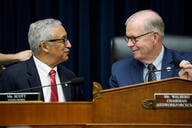You have /5 articles left.
Sign up for a free account or log in.
Barnes & Noble Education has joined an alliance of publishers and distributors taking steps to stop the sale of illegally copied textbooks. The company said in a news release that it would be adopting a set of Anti-Counterfeit Best Practices to ensure it only distributes authentic materials.
The best practices were drawn up by publishers Cengage, Elsevier, McGraw-Hill Education and Pearson and encourage distributors to take positive steps to avoid buying and selling counterfeit books, which can sometimes look convincingly like the real thing.
The publishers said that sales of such books were a growing problem for the industry, and a violation of their copyright and trademark rights.




